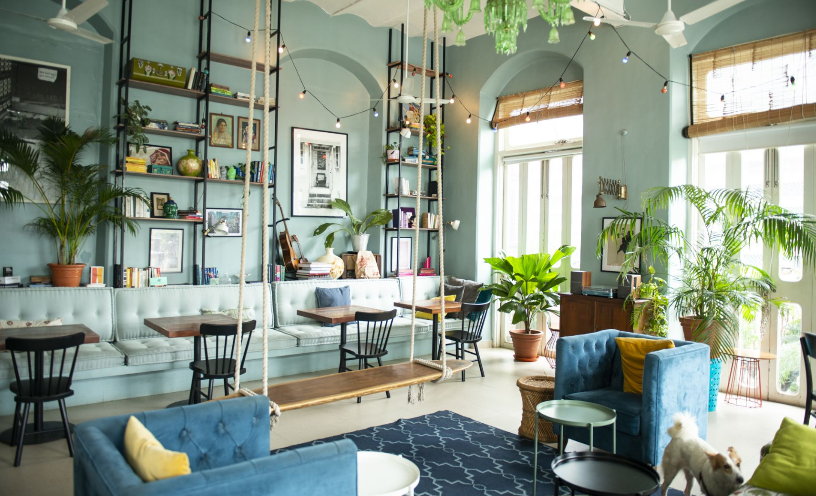Facilitating Flexibility for the End User: Ministry of New Case Study
Ministry of New is a design-led coworking space in Fort Mumbai, India. It’s a local hub for independent professionals who are looking to tap into an international business community and can accommodate teams of up to 10. The space also hosts a range of insightful events, from “adopting a zero-waste lifestyle” to “productivity hacks in times of quarantine”.
Jaosh Sethna is Director of Operations at Ministry of New. Since joining the space when it opened its doors in 2016, he achieved operational profitability within the first year and 80% client retention within three. We caught up with Jaosh to find out why Nexudus was (and still is) his coworking management platform of choice.
Replacing spreadsheets with a streamlined solution
In the first month or so we relied on an Excel file to record and manage our memberships, begins Jaosh. At that point we were just setting up the space, the routers and our IT. Our WiFi operated very much like a cafe’s in the sense that we were manually giving out the password to visitors.
After the first month, we knew we needed to start looking for a management solution. We were thinking of introducing flexible membership plans for 5 to 10 days a month and that’s when we decided to find and implement something quickly.
Jaosh and his team identified an India-based management solution, but it only provided the basic setup for internet connectivity. It also lacked options for invoicing and implementing flexible memberships - both of which were crucial for Ministry of New.

WiFi integration & flexibility
First and foremost, Ministry of New required a solution that would provide them with WiFi integration and the capacity to facilitate flexible memberships. At the time, Nexudus was the only coworking management platform that ticked all the boxes.
Alongside the necessary WiFi integration, the flexibility that Nexudus provided was the biggest draw. That’s why we went ahead with Nexudus - it actually just solved our problems!
We were at the point where we were thinking of lots of ideas for our space and wondering how they were going to function with technology. Nexudus took care of our existing needs and opened up possibilities for the future - adds Jaosh.

Nexudus has changed a lot since Ministry of New onboarded it in 2016. Among other things, we’ve introduced integrations with a range of other technology providers - including, most recently, the open-source video conferencing platform Jitsi.
One of the things Jaosh and his team like best is that these updates don’t affect how they use the platform day-to-day. The platform aligned with our needs so perfectly that we didn’t actually require any changes, and whatever changes were made didn’t affect our way of working.
When a lot of solutions update the whole interface changes and everything suddenly looks like a different environment. For us it’s been very smooth sailing with Nexudus; as an operator, if something’s running smoothly, you let it run smoothly.
I can rest assured that the technology is taking care of things and can focus my attention on areas like marketing, says Jaosh.
Using Nexudus to facilitate hourly membership plans
A couple of years ago, Ministry of New decided to diversify their membership offering and allow users to access the space on an hourly basis.
The hourly membership is one of the most unique memberships that we have as a space: I think only one or two other spaces provide this kind of membership. It’s a unique plan and people love it - they come in the morning and use the space for a couple of hours and then go out to meet clients before returning later in the afternoon.
It was one of our highest selling plans for a while. We priced it in such a way that it was higher than a flexible membership (5 or 10 days) but lower than a dedicated membership. Occasionally, members who start out with a flexible membership will switch to a dedicated desk. This level of flexibility is made possible with Nexudus.
The beauty is that all the features are included so if you need them they’re there.
Ministry of New and its members value personal interaction, so automation isn’t always necessary. For instance, a lot of members really appreciate that there’s always someone at the front desk to chat with while booking a meeting room.
There’s a lot we do - I don’t want to say “manually” - but without downloading extra apps, etc. Another thing we so use Nexudus for though is invoicing. Invoices have to go out on time and we have to get our money on time - that’s the most important thing, says Jaosh.
Enabling integration through APIs
Some tech platforms try to look nice and appear slick on the surface, but if the functionality isn’t there that doesn’t really help us. You can tell Nexudus is technology-focused and the APIs have really helped us a lot. We use Zoho Forms to create our registration forms. Once a visitor or member submits it, the information goes directly to Nexudus. We had an intern who really helped us strengthen the connection between the APIs.
The user can enter their details, including information about why they’re using the space (for an event, trial day, meeting, etc.). Nexudus provides the user with an access token that is sent via an sms, which also provides a link to the WiFi.
We also use Zoho Forms to personalise registration form content depending on whether the member is an individual or part of a team. For instance, if the person registering is an employee, the invoice will be directed to the company.
All this information is fed to Nexudus.
Jaosh also explains that the information Nexudus consolidates is used to create Zoho Reports. While it’s possible to create registration forms and reports with Nexudus, Ministry of New were already using Zoho prior to onboarding Nexudus and are happy with the integration.

Jaosh Sethna is the Director of Operations at Ministry of New.
Want to read more about what our customers say? Check out our other case studies.
Related stories
Global Coworking Trends and Opportunities for 2025
Now well into 2025, the coworking industry continues to demonstrate strong momentum. With demand for coworking spaces remaining steady around the globe, it's clear that coworking is not just enduring—it's thriving. Let’s explore the major trends and opportunities shaping the global coworking landscape this year.
Creating Events that Drive Community Engagement in Coworking Spaces
Community is everything in coworking, but a genuine sense of connection between members doesn’t magically happen overnight or by chance. Often, meaningful relationships take intentionality, effort, and time to build, with events being an effective vehicle for bringing people together around shared interests, goals, and experiences, creating opportunities for collaboration, and a thriving coworking culture. This article looks at creating events that drive community engagement in coworking spaces.
Liz Elam: ‘Community is the number one amenity in coworking spaces’
A household name in the global coworking industry, Liz Elam, is the founder of one of the world’s best coworking event series: GCUC. Liz’s coworking roots began in 2010, when she established Link Coworking – a welcoming, affordable, and professional coworking space – in her hometown of Austin, Texas. Link Coworking achieved incredible success, expanding across three locations and becoming the fourth-largest coworking brand in Austin. It was sold in 2019, making Liz the first woman globally to exit a coworking brand.
Key Takeaways from the Coworking Alliance Summit 2025
Gathering online for the Coworking Alliance Summit last week, members of global coworking alliances, coworking spaces, and community leaders came together to navigate global issues, strengthen ties across the coworking industry, and work collectively towards future goals.
5 Ways to Reduce Noise in Open Offices & Coworking Spaces
Some people like working against a background of noise, while for others it’s their worst work nightmare. The truth is, our relationship with noise depends on our own preferences and the nature of our work.
Key takeaways from the Workspace Design Show 2025
London’s Workspace Design Show is undoubtedly one of the best coworking events of 2025. For one, the exhibition (held at Islington’s Business Design Centre) features a host of innovative and creative workspace design solutions tailored to the needs of modern workplaces.
What Is Workplace Management and Why Does It Matter?
There has always been a need for workplace management – the process of organising and optimising physical spaces, resources, and operations to support people’s needs. But, as 28% of UK working adults were reported to work in a hybrid capacity last autumn (by the Office for National Statistics), the question of ‘why workplace management matters’ is more critical than ever. Let’s look at the workplace management benefits for your operations.
10 Smart Goals for your Coworking Space: How to Set & Achieve Business Objectives
Coworking is synonymous with creativity, collaboration and productivity. Businesses and freelancers love coworking spaces because (by surrounding themselves with fellow workers) they’re more likely to achieve their goals. The coworking environment, while social, is set up to facilitate focused, distraction-free working.
The Best Coworking Events in 2025: Must-Attend Gatherings for Professionals
Managing coworking spaces is an all-encompassing role, often leaving operators, owners, and community managers with little time to focus on personal growth or draw inspiration from others.
10 Award-winning Coworking Space Designs: A Comprehensive Guide
Vibrant, contemporary workspaces create an undeniable ‘wow’ factor. Textured designs and ambient lighting make spaces feel warm and cosy, while natural elements and biophilic design features have literal mood-boosting properties.

